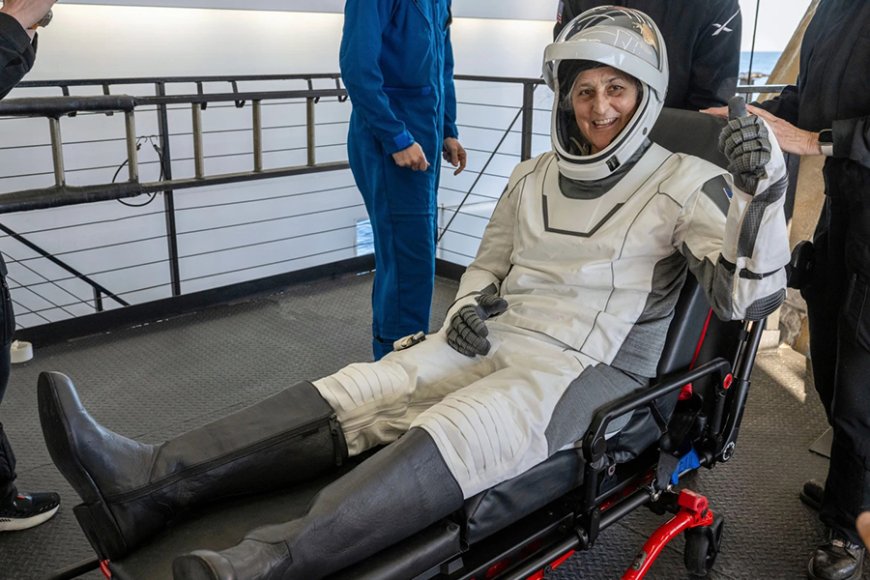NASA astronauts Butch and Suni return to Earth after being stranded in space for nine months
NASA astronauts Butch and Suni return to Earth after being stranded in space for nine months.

No longer stranded in space, NASA astronauts Butch Wilmore and Suni Williams finally returned to Earth on Tuesday, taking an alternate ride home after an unexpected nine-month stay in orbit.
Their SpaceX capsule made a successful splashdown in the Gulf of Mexico off the coast of Tallahassee, Florida, just hours after departing the International Space Station. The landing marked the end of their prolonged journey, which had begun with a troubled Boeing test flight last spring. Within an hour of landing, the astronauts emerged from the capsule, smiling and waving before being escorted away for routine medical evaluations.
Originally, Wilmore and Williams were supposed to spend only about a week in space after launching aboard Boeing’s Starliner capsule on June 5. However, technical issues plagued the spacecraft on its way to the station, forcing NASA to send it back to Earth empty and assign the duo to SpaceX instead. Further delays with the SpaceX capsule pushed their return from February to March.
Their return was made possible after a relief crew arrived at the station, allowing NASA to send them home earlier than planned due to a worsening weather forecast. Wilmore and Williams had spent an unexpected 286 days in space—278 days longer than intended—completing 4,576 orbits around Earth and traveling 121 million miles (195 million kilometers).
“On behalf of SpaceX, welcome home,” SpaceX Mission Control radioed after splashdown.
“What a ride,” responded Hague, the capsule’s commander. “I see a capsule full of grins ear to ear.”
As divers prepared to recover the spacecraft, dolphins circled nearby. Once on the recovery ship, Wilmore and Williams emerged from the capsule, with Wilmore flashing a double thumbs-up.
Their extended stay drew global attention, transforming “Butch and Suni” into household names. While other astronauts have spent longer periods in space, none had faced such uncertainty regarding their return. Despite the unexpected extension, they quickly adapted, taking on full crew duties, conducting experiments, making repairs, and even completing spacewalks. Williams set a record for the most career spacewalking time among female astronauts, logging 62 hours over nine excursions.
Having previous experience on the space station, both astronauts were well-prepared. Williams even took on the role of station commander three months into their mission and held the position until earlier this month.
Their prolonged mission became politically charged when former President Donald Trump urged SpaceX founder Elon Musk to expedite their return, blaming delays on the Biden administration. NASA, already exploring options, ultimately swapped the original SpaceX capsule for a used one to speed up their journey home. Musk later congratulated the astronauts via X.
NASA originally contracted both SpaceX and Boeing to provide astronaut transport after the shuttle program ended, ensuring redundancy in access to the station, which is set for decommissioning in 2030. With Boeing’s Starliner still undergoing engineering assessments, SpaceX is scheduled to launch the next NASA crew as early as July, with a decision pending on whether Boeing will be cleared for future crewed flights.
Both Wilmore, 62, and Williams, 59, are retired Navy captains accustomed to long deployments, though they admitted the extended mission was hard on their families. Wilmore missed most of his younger daughter’s senior year of high school, while Williams kept in touch with her husband and relatives through internet calls.
Supporters in the U.S. and India closely followed their journey, with Hindu temples across the U.S. offering prayers for Williams, who has Indian and Slovenian heritage. Wilmore’s Baptist church in Houston also prayed for his safe return.
Celebrations erupted in Jhulasan, India, the ancestral home of Williams’ father, where people danced and performed rituals in a temple.
After landing in the Gulf—recently renamed the Gulf of America by Trump in a January executive order—Wilmore and Williams will travel to Houston, where they will undergo medical evaluations before reuniting with their families. NASA officials expect them to return home within a couple of days.
What's Your Reaction?





















































































